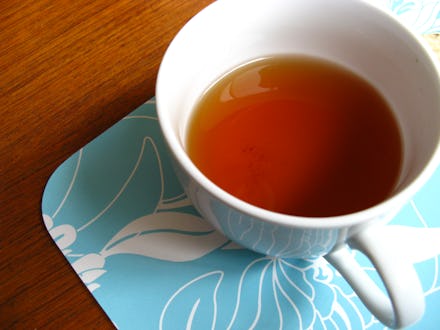Why Weight Loss Tea Is the Biggest Scam on Instagram

Another day, another perfectly lit photo of Kylie Jenner gets dropped on Instagram. But wait, what's the famously curvaceous 18-year-old looking toward in this photo from the backyard of her California mansion?
"Got my @SkinnyMintCom such a great natural detox tea program for this summer," Jenner's caption states. "I need to get healthy again! Who's joining me?" See? Looks like Jenner is finally revealing the secret behind her Pokémon-like evolution from normal person to alluring Instagram seductress. There's a reason she's famous!
Unfortunately, Jenner isn't sharing any groundbreaking Hollywood diet hacks — she likely isn't even drinking the tea, which she's clearly promoting for a company. She's not alone, however: As it turns out, those spammy pictures and captions that dozens of celebs share on Instagram aren't effective for many who have actually tried them.
What is weight loss tea? Thanks to an explosion of social media advertising, weight loss teas have seen an unprecedented spike in sales, with their entrepreneurial inventors raking in the cash by implementing successful methods of reaching consumers via celebrity endorsements. "Celebrity-powered endorsements on Instagram, YouTube, Facebook and other platforms have catapulted these herbal teas to worldwide audiences. What manufacturers fail to convey in their shinily positive social media posts is that many of the teas—and the associated weight loss—come from drinking senna, a natural laxative," Broadly noted.
Weight-loss tea's recent marketing campaigns combine powerful household names with the promise of an easy, tasty solution to cleanse the body and help lose weight. The results of daily consumption, however, aren't quite as simple as the message these campaigns promote.
So what's the problem? "We want to pick a little bone here with the fitness industry," Super Sister Fitness health bloggers Liz and Sarah said in a YouTube video. "Our No. 1 problem with the fitness industry is that it's all about selling you products, pills, potions, powders [and now teas], like what is all this stuff? ... You don't need any of that, it's so silly.
"And it's just trying to make a profit off of you really just not knowing and not being educated on whether or not those things are really effective."
Of course, paying celebrities lump sums to post about weight-loss products is a successful marketing tactic, as it carves out a simple path to positive press. A picture of Kylie Jenner showing off her weight-loss tea will inevitably lead to a slew of similarly promotional headlines like: "So THIS Is How Kylie Jenner Stays So Skinny (PHOTO)."
But... Does it work? In a word: No. Because detoxing isn't real — not the sort of detoxing these marketers want you to believe in, at least.
"Let's be clear," Edzard Ernst, emeritus professor of complementary medicine at Exeter University, told the Guardian. "There are two types of detox: One is respectable and the other isn't. The other is the word being hijacked by entrepreneurs, quacks and charlatans to sell a bogus treatment that allegedly detoxifies your body of toxins you're supposed to have accumulated."
Our bodies are fine without the scams. "The healthy body has kidneys, a liver, skin, even lungs that are detoxifying as we speak," Ernst told the Guardian. "There is no known way — certainly not through detox treatments — to make something that works perfectly well in a healthy body work better."
Detox teas like Lyfe tea — which Jenner's oldest sister Kourtney Kardashian promotes on her own Instagram — contain natural ingredients like senna leaves and pods, moringa and guarana. Unfortunately, none of these are proven to actually promote digestive health or lead to healthy weight loss: Senna is a laxative that can cause stomach pain and diarrhea; moringa is considered a superfood (another contested marketing ploy) and, according to WebMD, there is not enough information out there to determine moringa's health benefits; and guarana is known to raise blood pressure, with zero known effects on weight loss.
Detox dietary supplements further promote a rejection-diet mentality, in which dieters are more likely to shy away from certain foods rather than focusing on implementing new, nutrient-rich foods into their daily meals.
"Long-term fasts lead to muscle breakdown and a shortage of many needed nutrients," American Dietetic Association spokesperson Lona Sandon told NBC News, noting that the removal of necessary nutrients and minerals from food may "actually weaken the body's ability to fight infections and inflammation."
What are the recommended alternatives? Rather than detoxing, anyone trying to get in peak physical health should include things like greens, lean meats and other nutrient-rich foods into their diets. Harvard University School of Public Health's Healthy Eating Plate provides a realistic diet for just about anyone and, when paired with daily exercise and activity, can certainly help weight loss results and other health goals.
Or you can take your nutrition advice from King Kylie — your choice.